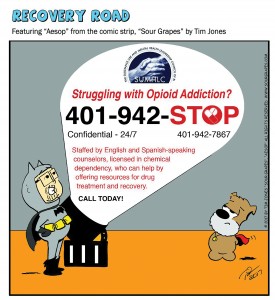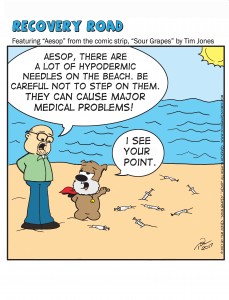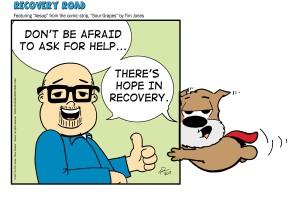For some of us, the rising deaths from drug overdose are just numbers on a page. But for many others, it is too real: a close friend or family member is found unresponsive and suddenly the emergency crew and the flashing lights are reflecting on our own walls. There are fewer and fewer among us who have not been touched.
How do so many seemingly “normal” people become addicted? There is no simple answer, which is why the problem is so difficult to solve. A variety of forces are at work – first, there is the matter of addiction itself. Addiction is a medical condition; those who have it do not react to drugs as others do. Some of us can take prescription opioids a few days for pain, and then give them up without an afterthought. For others, from the moment the drug hits their systems, a hunger is unleashed that will never be satisfied. For them, addiction becomes a painful struggle that never ends.
of addiction itself. Addiction is a medical condition; those who have it do not react to drugs as others do. Some of us can take prescription opioids a few days for pain, and then give them up without an afterthought. For others, from the moment the drug hits their systems, a hunger is unleashed that will never be satisfied. For them, addiction becomes a painful struggle that never ends.
Then, there is the accessibility of drugs. As in many other states, the overdose crisis in RI began with doctors and pharmaceutical prescriptions. But as restrictions fell into place and prices increased, it became far easier and cheaper to get heroin. The distribution network for this drug is wide enough that it can be ordered online and delivered to your door. Since 2009, deaths caused by prescription drugs have leveled; now it is deaths from illicit drugs that are on the rise, and those caused by a combination of illicit drugs and prescription medication are up nearly a third since 2011. Recent news from the RI State Department of Health (RIDOH) is chilling: despite all efforts, the number of deaths from overdose is relentlessly increasing in Rhode Island.
 The job of saving these lives becomes more difficult all the time. Since its introduction as the first line of defense against overdose, many people have been saved by Narcan. The number of deaths from overdose would have doubled without it. However, there is now a growing threat: new shipments of Fentanyl are coming in from China and the drug has been altered. When the formula is changed by even one molecule, the current Narcan loses a great deal of its effectiveness. Now it can take multiple repeated doses to bring an overdose victim back to life.
The job of saving these lives becomes more difficult all the time. Since its introduction as the first line of defense against overdose, many people have been saved by Narcan. The number of deaths from overdose would have doubled without it. However, there is now a growing threat: new shipments of Fentanyl are coming in from China and the drug has been altered. When the formula is changed by even one molecule, the current Narcan loses a great deal of its effectiveness. Now it can take multiple repeated doses to bring an overdose victim back to life.
But even as the odds against survival are rising, an army has gathered in our state that is working to open lines of communication, making a preemptive move to reach addiction problems at their source before they can careen out of control.
In that army, one man is a battalion unto himself in the effort for recovery outreach. John Tassoni, Jr. served as a member of the Rhode Island senate from 2001 – 2012 and sponsored legislation providing a high school program for teens in recovery. After leaving the senate, he founded Recovery Radio in 2015. The show, airing Mondays from 3 – 4pm on AM Talk Radio 790, was created with the purpose of bringing information and resources to individuals and families in RI who are struggling with alcohol, drug and other addictions. The broadcast, sponsored by Phoenix Houses of New England, is the first of its kind in the state, featuring on-air interviews with people in recovery who share their stories of struggle and hope.
John is also the owner of the Smithfield Times, a monthly publication, and of Common Ground, a weekly program on AM Talk Radio 790, Mondays from 4 – 5pm. John hosts the show, which covers labor and issues affecting working families in Rhode Island. He has found that the destructive effect of addiction also seeps into the economy of our state. It was surprising to learn that one reason behind unemployment in RI is that people can’t pass drug tests. Electric Boat would like to hire more people, but applicants can’t pass the tests. You can’t get a job if you can’t get off drugs – and alcohol use is also on the rise, another nail in the coffin of the unemployed.
John puts his number out there for people to call and answers all messages and emails; he knows that when people reach out for help, they are at a point where their lives are in a tailspin. They fear for children, parents, loved ones … they don’t know if they will come home to find someone dead. They need help NOW; tomorrow is often too late. This is something that John takes personally. When his day is done, if he has saved a life or two, he feels he’s done his job.
Sometimes, reaching people requires a unique approach, and to that end, Tassoni called upon the talents of local cartoonist Tim Jones. Tim got his start on Common Ground and the Smithfield Times in 2013, with a comic strip called “Sour Grapes.” The series features Aesop, a miserable flying dog who reluctantly puts up with his odd friends and the problematic world they all share. The character gained such popularity that Tim has now self-syndicated the strip in 20 different newspapers, including Motif. Recovery Radio has since adopted the dog as a mascot and Tim began a new spin-off series, collaborating with John Tassoni, titled “Recovery Road” that puts a touch of levity on the serious subject of recovery. For more, visit 790business.com/recoveryradio
The success of these methods illustrates a point: Sometimes, reaching those who need help is work that is outside the job description and skill set of federal and state agencies. The arts are becoming a new weapon in the arsenal against addiction.
Creating Outreach About Addiction Support Together (COAAST) is another organization taking unusual steps to remove the stigma from addiction and bring an open forum for conversation to the community. For them, “the play’s the thing.” Their production, Four Legs To Stand On, takes the familiar kitchen table and turns it into a metaphorical stage for the complex emotions that develop between family members struggling with addiction. This is theater as an arts-based means of outreach and intervention. According to Ana Bess Moyer Bell, COAAST founder, executive director, and playwright, “Drama therapy allows clients to practice healthy interpersonal skills, foster relationships, express their emotions and explore a drug-free future … we cannot escape the stories that shape our lives, no matter how painful. Only in bringing them into the light can we rewrite their endings.”
community. For them, “the play’s the thing.” Their production, Four Legs To Stand On, takes the familiar kitchen table and turns it into a metaphorical stage for the complex emotions that develop between family members struggling with addiction. This is theater as an arts-based means of outreach and intervention. According to Ana Bess Moyer Bell, COAAST founder, executive director, and playwright, “Drama therapy allows clients to practice healthy interpersonal skills, foster relationships, express their emotions and explore a drug-free future … we cannot escape the stories that shape our lives, no matter how painful. Only in bringing them into the light can we rewrite their endings.”
The 35-minute drama is followed by an open discussion with the audience. Have the results been successful? The CDC cast its affirmative vote by awarding COAAST a that which will enable them to take the performances statewide.
Four Legs To Stand On developed after RI actor Paul Kandarian met Ana Bess Moyer Bell, a drama therapy graduate from NYU, on the set of a movie. She told him about an idea she had for a play; with Paul’s help, the play became a reality. What began as a single story focusing on a son became two versions of a play that follows a family in which the father deals with cancer, while the son (or daughter) battles drug addiction. The fact that cancer is openly talked about while addiction is shamed shows a glaring flaw in our attitude toward addiction as a society: We cannot stem the growth of this epidemic until we come to accept and understand the true nature and complexity of the problem. Addiction is a medical condition, not a weakness to be hidden away. It will respond to treatment and intervention. Getting help to those who need it should be our primary goal.
On January 15, The Rhode Island Department of Health (RIDOH) and COAAST will host a free community event from 6 to 9pm at Veterans Memorial Auditorium in PVD called “Owning Our Story: About the Opioid Overdose Epidemic.” The event will feature TED Talk-style presentations from local speakers, interactive skits and small scenes from Four Legs to Stand On. Their mission is to educate Rhode Islanders about addiction, shed light on the stigma and shame of the disease, and pave the road to recovery and healing. For more information, call 401-598-6061.